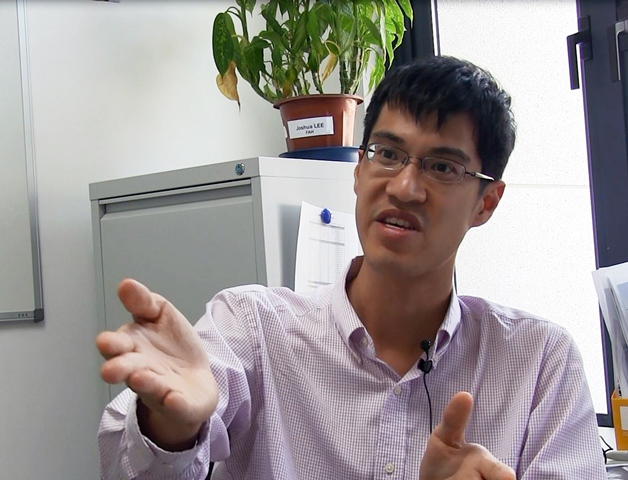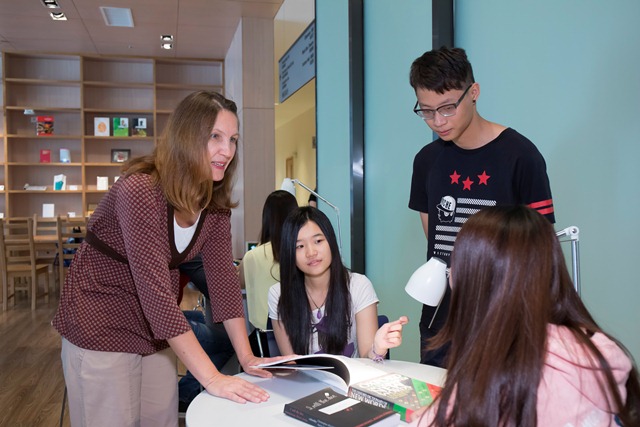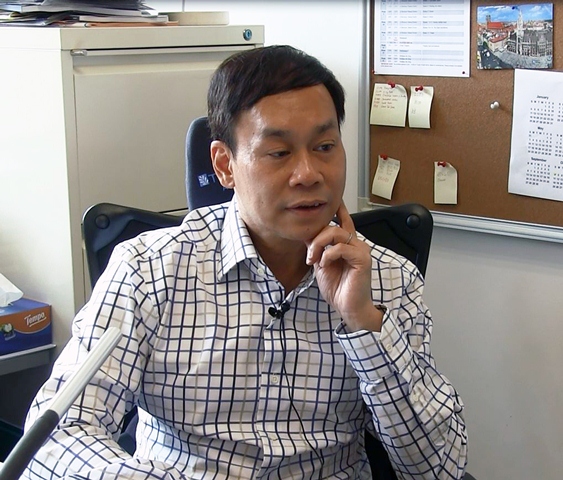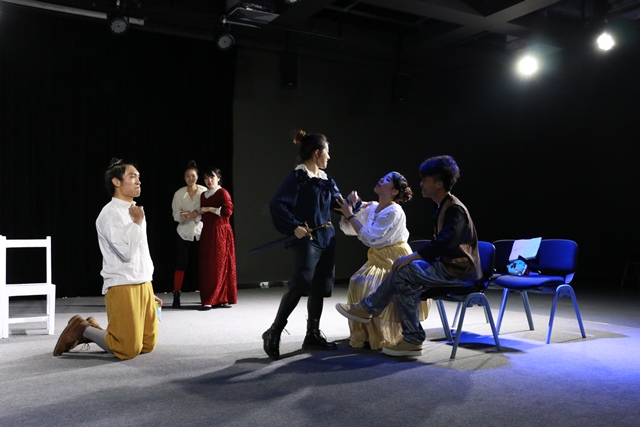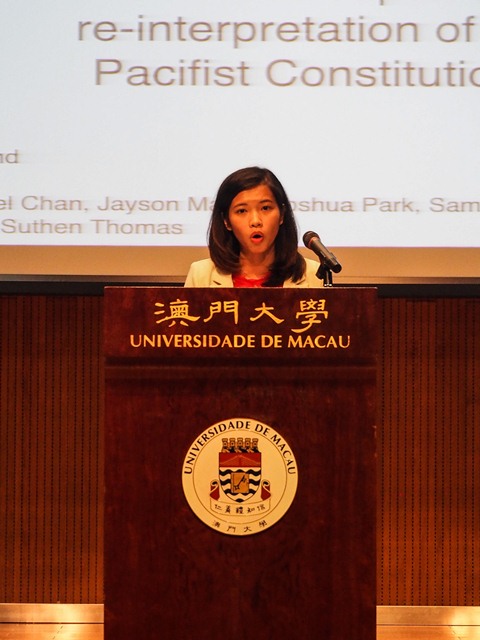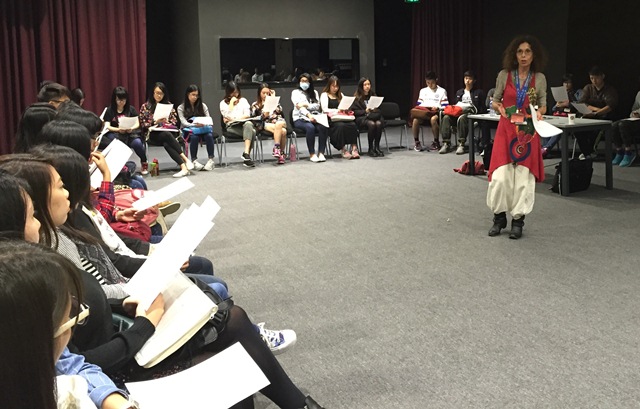Source: My UM
Are you struggling with your English? No worries. At UM, you can practise English anywhere and anytime you want.
Begin with Curiosity
‘Girls are emotion Ninja. Their favourite weapon is silent treatment. That’s their specialty dish,’ Honee Wang, a second-year student majoring in English Studies, was delivering his humourous speech in English. ‘My boyfriend pisses me off, so I won’t talk to him until he says sorry. But girls, for us guys silent treatment is not a punishment; that’s a freaking reward. Boys and girls think differently, especially while driving. We boys always want to drive faster, but you girls,’ he paused and made his lips ‘sexy’ with a red marker pen, ‘are just busy with a fast make-up.’
The whole class laughed. The audience voted him the funniest speaker in the Humourous Speech Contest, which was part of the English Festival. ‘He deserved the trophy,’ said Joshua Lee, the judge and senior instructor from the English Language Centre (ELC). ‘Honee did a good job in exaggerating his emotions. His stories were well-focused and his humour was self-deprecating. That kind of humour is safer as it doesn’t insult anyone.’
A Contest beyond Humour
The contest was part of the ELC’s effort to promote the use of English on campus. Joshua was pleased that the students drew upon their own life experiences and came up with original ideas. The subjects of the participants’ speeches range from relationships to campus life to places they have travelled. However, the contest was not just about public speaking or English fluency.
‘Some of the speeches made us think deeper about different issues,’ said Joshua. ‘For example, one speaker discussed how women obsess about their weight, but she deconstructed it in a humorous way and ended with a positive message about being proud of who you are. It also gave students a chance to stretch their creativity and imagination.’
‘Being funny in English, or any other language for that matter, is difficult, especially if the language is not your mother tongue,’ said ELC Director Dr Evelyn Doman. ‘You have to know the logic of the language and figure out the context of the culture. I’d say humour is the last thing learners will acquire in learning a language.’
‘A lot of times when I go see a Hollywood movie, I think that it’s funny as I hear it in English and in my culture, but the audience reading the subtitles don’t think it’s funny because it’s over their heads or the humour is different in their culture,’ she said. ‘So I know who the “foreigners” are in a local movie theatre.’
Motivating English Festival
Over ten workshops, including Jack-o-Lantern making and Crochet DIY, as well as several contests, were held during the three-day English Festival in October. The English Festival takes place twice a year, with the aim of improving students’ English.
‘It’s good to have extracurricular activities in which students feel comfortable using English,’ said Evelyn. ‘There are no grades given, no competition. They’re exposed to a friendly learning environment, where they feel they can make mistakes. That helps build their confidence in English.’
‘When students have a problem, they need to ask in English. So they have to think how to ask and learn to express themselves with the vocabulary they know in English. That’s how they develop their language skills,’ said Evelyn. Apart from the festival, the ELC Chatroom provides another opportunity for students to practice speaking English. ‘They can just walk in when they have time. We’re always here,’ she said.
Find an English Buddy
The more you expose yourself to a language, the faster you progress in the language. That’s why Joy Loi, a second-year student majoring in Hospitality and Gaming Management, joined UM’s Buddy Programme last semester. It’s a volunteer-based programme that offers an opportunity to build one-on-one relationships with foreign exchange students.
‘I made many friends from the United States and Germany. We speak English whenever we meet because it’s our only common language,’ said Joy. ‘I wasn’t very good at daily English conversation, because I mainly focused on reading comprehension when I was in high school. So the programme also helped improve my spoken English.’
As an English learner, Joy has made her share of English mistakes, some of which she says she would remember for the rest of her life. ‘Once I wanted to share some snacks with my buddy but I mispronounced the word “snack” as “snake”, and this incident has become a running joke between us.’
Commitment to English Project
Practicing speaking English is perhaps one of the fastest ways to improve one’s English skills. And that’s why Dr Chiu Man Yin, programme coordinator of BA in English Studies, requires his students to act out English plays, a teaching strategy he has been using since 1997 when he first taught the course Introduction to Literature.
‘A play text comes alive only when somebody speaks it. So it’ll be wonderful if I can get the students to act it out, to speak the lines on stage, rather than just read it at home. It works wonderfully because it’s a challenge,’ Dr Chiu said. ‘Most students didn’t think they could do it at first.
Chiu often chooses a play with strong characters and good lines to make it easier for students to bring alive the dialogues instead of simply reciting mechanically. ‘That’s not rote memorisation. You remember the lines because you understand the context and emotions, and then you reproduce them in your own way. This kind of training is really helpful in language learning.’
Express Yourself Concisely and Eloquently
Another project that helps immerse the students in the English language is intensive training in English debates. Sindy Leong, a fourth-year student of communication who has received the Best Debater Award in the Australasian Debating Championship, shares her experience in English learning. ‘In traditional classrooms, learning is predominantly a one-way process. We just sit and listen, rarely having the chance to speak up and practice spoken English. But in the debate training, we talk a lot and exchange views on what we’ve read in the newspaper, and all of this is done in English. It enhances not only our understanding of global current affairs but also our language ability,’ Sindy said.
When she joined the debating team, Sindy was told that English proficiency is a must and the skills to express herself concisely and eloquently was what she needed to master next. ‘I’m now capable of impressing the judges with humour and satire.’
English-Only Classroom
All the courses at UM are delivered in English, except for the language courses in Chinese, Portuguese, German, and Japanese. For some freshmen who were used to having courses conducted in Chinese before they started college, it may take them a little longer to adapt to a new English-learning environment, but the effort will be worth it.
‘Let’s say you take a course in business, which is not really about English, if it is delivered in English, and you read the teaching material in English and answer the questions in English, all of those things reinforce your skills in English . Every course reinforces English proficiency,’ Dr Chiu said. ‘No matter what we study, we would find it more frustrating to learn complex ideas in a second language than in our mother tongue. But proper teaching methods will remove the language barriers.’



